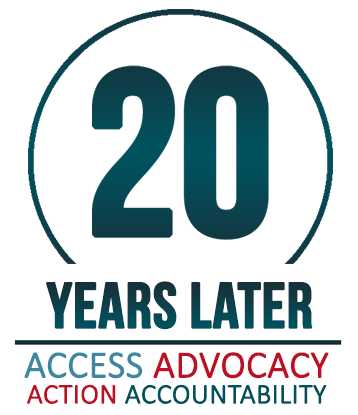Guest Post by Dr. Patricia Ganz: What Cancer Patients and Their Families Can Do to Coordinate Post-Treatment Care
| This post is part of our 20 Years Later blog series which examines progress in advancing the principles in the 1995 NCCS publication Imperatives for Quality Cancer Care: Access, Advocacy, Action, and Accountability (Imperatives), this month we will look at the ninth principle of Imperatives: “The responsibility for appropriate long-term medical care must be shared by cancer survivors, their families, their oncology team, and primary care providers.” |

Guest Post by Patricia A. Ganz, M.D, founding member of the National Coalition for Cancer Survivorship
Twenty years later, the 9th Principle of the NCCS Imperatives for Quality Cancer Care could not be more relevant. Increasingly, patients are required to take more responsibility for their health, using knowledge and self-monitoring tools that have become an essential part of medical care, such as monitoring of blood pressure, physical activity, and weight-—to name a few easily measured parameters. As with many chronic conditions such as asthma, diabetes, and some forms of cardiac disease, cancer patients must play an active role during and after their treatment, into survivorship and beyond. While their oncology care providers need to chart the course of treatment, preferably with a care plan that has had active input by the patient and their family. However, it is the patient who will be most well-informed about the side effects of treatment, and the physical and psychosocial sequelae that result from the cancer and its treatments. Increasingly, cancer survivors can track their own health, medical conditions, and symptoms over time using electronic tools and journals; they can provide valuable input to the health care team in this process.
Identifying and organizing the post-treatment medical care team for cancer survivors has become increasingly complex in the past two decades since the NCCS Imperatives for Quality Cancer Care were developed. The cancer care team usually includes multiple clinicians, and there may be additional medical subspecialists who become involved in management of the long-term or late effects of cancer treatment (e.g., cardiologists, pulmonologists, gastroenterologists). Many cancer survivors do not have access to a specific health care provider who they can turn to for non-cancer medical concerns, and even when they have had a long term relationship with one, that clinician may feel uncomfortable continuing to manage non-cancer issues in the setting of a complicated cancer treatment history.
During the past decade, there has been increasing awareness of this gap in coordination of post-treatment care for cancer survivors. With the 2006 Institute of Medicine (IOM) report on adult cancer survivors1 calling attention to the needs of the growing numbers of cancer survivors, and the more recent 2013 IOM report on delivering high quality cancer care,2 as well as changes associated with the implementation of the Affordable Care Act and other federal interventions (e.g., implementation of electronic health records, patient-centered medical homes), the medical community is much more focused on care planning, coordination of care, communication, team based care, and measuring quality. We are in the midst of a major transformation of the health care system, and there is some hope that this will benefit cancer survivors, by bringing them into less fragmented systems of care, with a uniform medical record, and more comprehensive assessment of their needs without duplication of efforts. However, this is still a work in progress.
In the meantime, what can cancer patients and their families do to ensure the best coordination of care as they move forward in the post-treatment period? First, if possible, they should obtain a treatment summary and care plan from their treating oncologist that can be maintained for future reference, as we know that medical records can be destroyed (e.g. Katrina) and this can serve as a vehicle to promote communication between the oncologist and the patient’s primary care clinician. There are many tools to facilitate this. I have been part of the Journey Forward collaboration, and we have developed an app for patients to use called “My Care Plan” that can help get things started. As part of that discussion with the oncologist, the patient and their family should ask how frequently they need to be seen by an oncology specialist for follow-up and which member of the oncology team should be the primary point person. If appropriate, specific follow-up tests and procedures could be taken over by the primary care provider, especially if the oncology provider is not easily accessible (e.g., distance to travel, limited time to see patients in follow-up).
Sharing of medical test results is a lot easier today than in the past, and the main focus should be on sharing of information and regular communication between the oncologist and the primary care clinician. Primary care providers are increasingly familiar with the long-term management and follow-up of many types of adult cancers, and thus the cancer survivor should try to engage their primary care provider in assuming some of this responsibility if possible. Many routine issues, such as management of blood pressure, weight management, depressive symptoms, bone health, and pain are often areas in which primary care providers have substantial competence. The care plan provided by the oncologist is necessary to fill in any gaps that are unique or unusual in relationship to the patient’s cancer experience, as well as to ensure that any specialized tests are performed. This is also something that is much easier to accomplish if the survivor is no longer taking cancer directed therapy.
The key for everyone involved is to openly discuss these issues. Cancer survivors seldom want to be discharged from the care of their treating oncologist, and primary care providers may have anxiety about missing a symptom of recurrence. Open discussion of how well each member of the professional team can support the cancer survivor in the post-treatment period is essential and the new frontier in coordination of cancer care. With the aging of the population and the continued growth in the number of cancer survivors,2 with rare exception, cancer survivors will no longer be accommodated for long-term follow-up in oncology clinics—there are just too many new patients who will need to be seen!
About the Author: Patricia A. Ganz, M.D., a medical oncologist, is a member of the faculty of the UCLA Schools of Medicine Public Health, where she is Distinguished Professor of Medicine and Health Policy & Management and an American Cancer Society Clinical Research Professor. She is the Director of the Center for Cancer Prevention and Control Research at the Jonsson Comprehensive Cancer Center, where she also leads the Patients and Survivors Program. Dr. Ganz was elected to the Institute of Medicine in 2007, and received the American Cancer Society Medal of Honor in 2010. She served on the National Cancer Institute Board of Scientific Advisors from 2002-2007 and on the American Society of Clinical Oncology (ASCO) Board of Directors from 2003-2006. Her major areas of research include cancer survivorship and late effects of cancer treatment, patient reported outcomes in cancer clinical trials, and quality of care for cancer patients.
The views & opinions expressed in any guest post featured on our site are those of the guest author and do not necessarily reflect the opinions & views of the National Coalition for Cancer Survivorship. Read our blog and comment policies here.
Sources Cited
- Hewitt M, Greenfield S, Stovall E. From Cancer Patient to Cancer Survivor: Lost in Transition. Washington, D.C.: The National Academies Press; 2006.
- Levit L, Balogh E, Nass S, Ganz PA. Delivering High-Quality Cancer Care: Charting a New Course for a System in Crisis. The National Academies Press; 2013.





